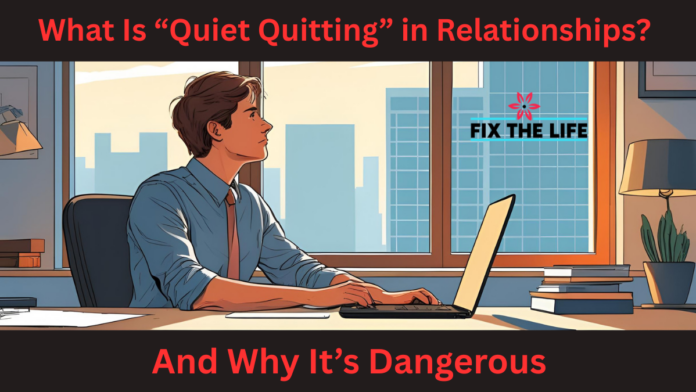Relationships thrive on communication, emotional effort, and mutual investment. But when one partner starts pulling away without directly addressing their concerns, it can lead to quiet quitting in relationships—a slow, passive withdrawal from the connection. Unlike an open breakup, quiet quitting is subtle, often unnoticed until the relationship is deeply strained.
In this article, we’ll explore the meaning of quiet quitting, the behaviors of an emotionally distant partner, the signs of disconnection, and why this phenomenon can be dangerous for long-term relationships.
What Is Quiet Quitting in Relationships?
Quiet quitting, originally a term from workplace culture, refers to disengagement without actively leaving. In relationships, it describes a scenario where a person emotionally checks out, going through the motions but no longer investing in the partnership.
Characteristics of Quiet Quitting in Love:
- Minimal emotional or physical effort in the relationship
- Lack of active participation in meaningful conversations
- Going along with the relationship without addressing deeper issues
- Withdrawal from shared experiences or affection
It often occurs when one person feels unheard, unfulfilled, or indifferent but avoids open confrontation. Instead, they quietly retreat while maintaining surface-level engagement.
Signs of an Emotionally Distant Partner
If your partner is emotionally pulling away, these behaviors may indicate quiet quitting:
1. Communication Feels Surface-Level
Conversations revolve around logistics—who’s picking up groceries, weekend plans—but lack emotional depth.
2. They Stop Making an Effort
Simple gestures, like planning date nights or engaging in meaningful discussions, disappear over time.
3. Physical Affection Declines
They seem uninterested in intimacy, hugs, or other small affectionate actions that used to be natural.
4. Increased Disinterest in Resolving Conflicts
Rather than discussing and fixing issues, they ignore problems or give vague responses like “It’s fine.”
5. Social Detachment
They may avoid spending quality time or appear distant when together.
These behaviors signal disconnection and often point to quiet quitting in relationships.
Why Quiet Quitting Is Dangerous
While quiet quitting is less dramatic than an abrupt breakup, its slow erosion makes it more painful in the long run. Here’s why it can be harmful:
1. Creates Emotional Uncertainty
Partners experiencing quiet quitting often feel confused, questioning whether something is wrong but receiving no clear answers.
2. Prevents Growth & Healing
Without open conversations, underlying problems remain unresolved, leading to resentment.
3. Delays an Inevitable Breakup
Instead of addressing the issues or moving forward, couples remain in limbo, prolonging emotional distress.
4. Leads to Self-Doubt in the Relationship
The disconnected partner might feel guilty for withdrawing, while the other partner feels insecure about why the relationship no longer feels fulfilling.
Addressing quiet quitting early can prevent irreparable emotional damage.
How to Address Quiet Quitting & Rebuild Connection
If you suspect that quiet quitting in relationships is happening, here are ways to confront it:
1. Acknowledge the Emotional Distance
Avoid ignoring the problem. Express your concerns with honesty: “I feel like we’ve grown distant lately. Have you noticed that too?”
2. Encourage Open Communication
Create a safe space where both partners can discuss their feelings without blame.
3. Reintroduce Emotional Connection
Revisit shared activities that once brought joy—date nights, deep conversations, or small acts of affection.
4. Ask Tough Questions
If disengagement persists, ask whether the relationship should continue. Understanding what each partner truly wants is key.
5. Seek Relationship Support
Therapy or counseling can help navigate unresolved emotions and restore balance.
Taking action early prevents quiet quitting from turning into full disconnection.
FAQs
Q1: How does quiet quitting differ from a breakup?
Quiet quitting involves slow emotional withdrawal while staying in the relationship, whereas a breakup is an explicit decision to leave.
Q2: What causes quiet quitting in relationships?
Common reasons include unresolved conflicts, emotional burnout, loss of connection, or feeling unheard in the partnership.
Q3: Can quiet quitting be reversed?
Yes, Open communication, rebuilding emotional intimacy, and mutual effort can restore a disengaged relationship.
Q4: How do I know if my partner is quietly quitting?
Look for signs of disconnection such as lack of affection, avoidance of emotional conversations, and decreased interest in spending time together.
Q5: When should I let go of a relationship affected by quiet quitting?
If efforts to restore connection fail and disengagement persists, it may be time to evaluate whether staying is emotionally healthy.
Final Thought
Quiet quitting in relationships is emotionally draining because it leaves one or both partners in a cycle of uncertainty and disengagement. Identifying signs of disconnection and addressing them early creates an opportunity for open conversations, renewed emotional investment, and clarity on the relationship’s future. Relationships thrive on effort—when it fades, deciding whether to rebuild or move on is essential for emotional well-being.




